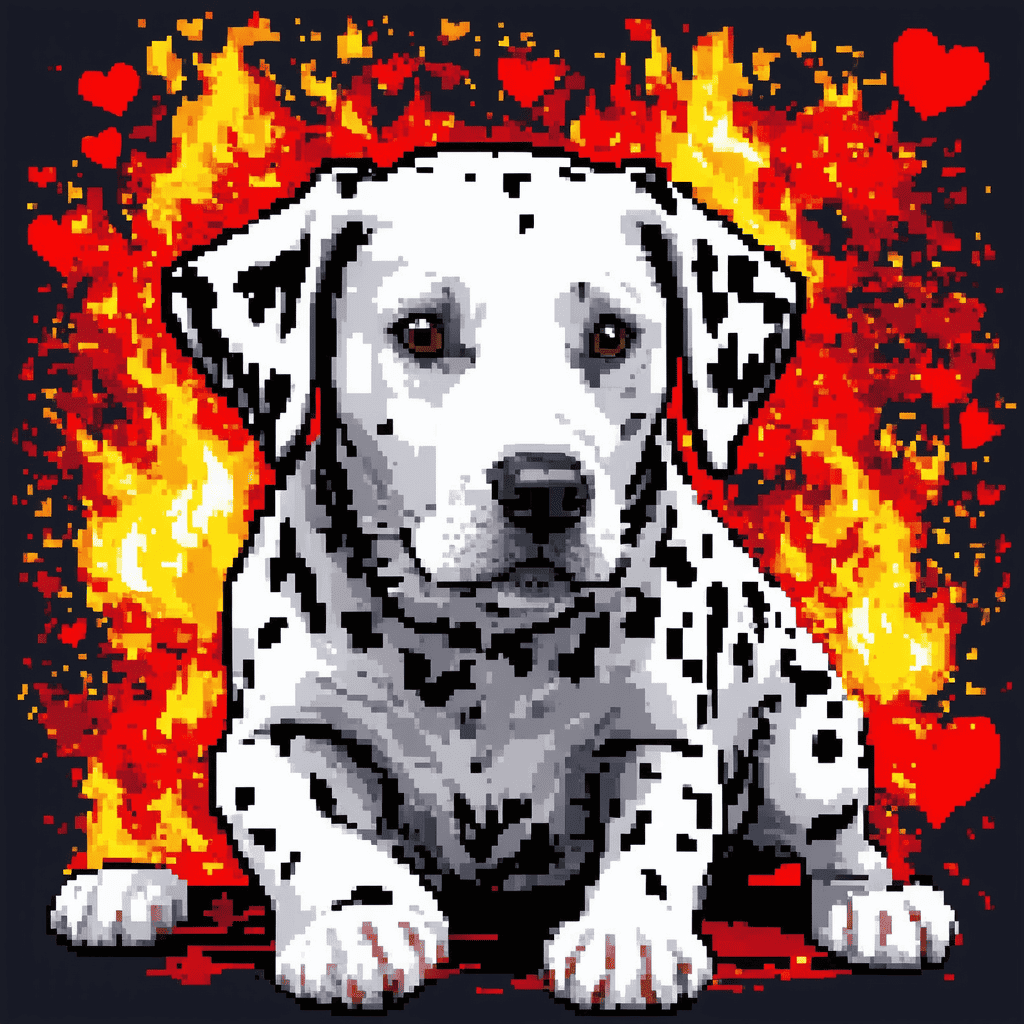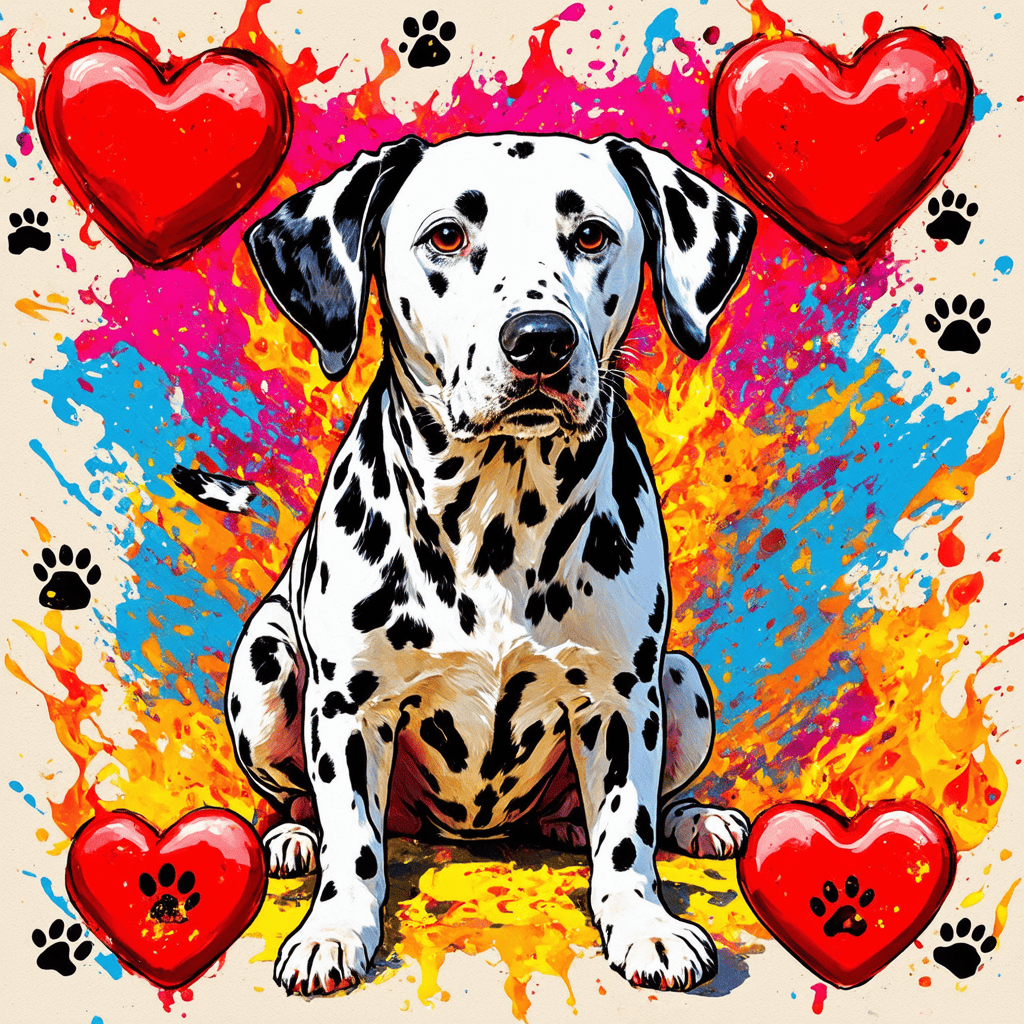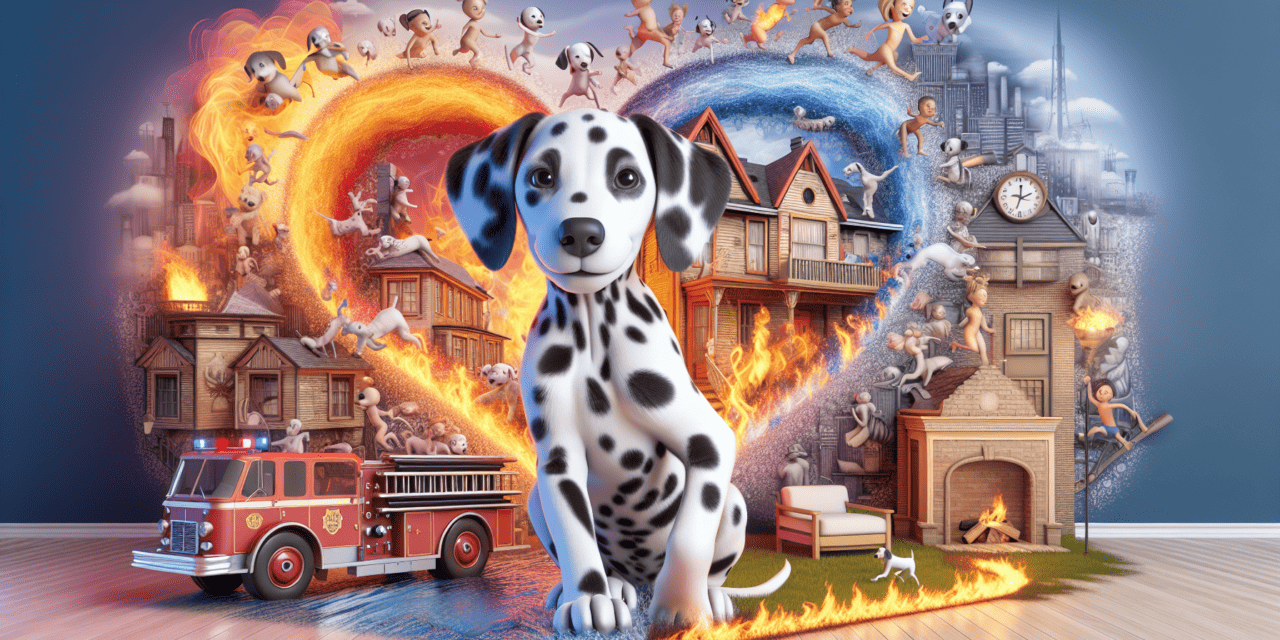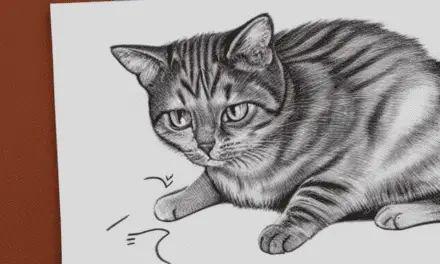Key Takeaways
- Loyal Family Companions: Dalmatians are known for their affectionate nature, making them excellent companions for families.
- High Energy Needs: These dogs require significant exercise and mental stimulation to thrive, ideal for active households.
- Trainable Yet Independent: While intelligent and trainable, Dalmatians can be easily distracted, requiring consistent training methods.
- Watchdog Qualities: Their protective nature makes Dalmatians good watchdogs, adding an extra layer of security to your home.
- Health Awareness: Prospective owners should be aware of breed-specific health issues, including deafness and urinary stones.
- Social and Friendly: Dalmatians generally get along well with children and other pets, especially with proper socialization.
- Firehouse Legends: Historically, Dalmatians have a unique connection to firefighting, serving as protectors and companions to horses.
- Commitment Required: Owning a Dalmatian involves a long-term commitment to exercise, training, and health care to ensure their well-being.
Welcome to The Complete Guide to Dalmatians: Family Companions, Firehouse Legends, and Cuddle Enthusiasts. If you’ve ever wondered whether Dalmatians make good family dogs or why these striking canines have a historical connection to fire departments, you’re in the right place. In this comprehensive guide, we will explore the unique characteristics of Dalmatians as family pets, delve into their fascinating role in firefighting history, and discuss the factors contributing to their declining popularity. Additionally, we’ll address common concerns about their maintenance needs, health issues, and behavioral challenges, ensuring you have all the insights necessary to decide if a Dalmatian is the right companion for you. Whether you’re considering bringing home a Dalmatian puppy or simply want to learn more about these affectionate dogs, this guide is designed to provide valuable information and tips for bonding with your new furry friend.
Are Dalmatians a Good Family Dog?
Dalmatians can be a good family dog, but there are several factors to consider:
- Loyal and Affectionate: Dalmatians are renowned for their loyalty and affection towards family members, forming strong bonds with their owners.
- Intelligent and Trainable: These dogs possess high intelligence, making them trainable. However, their independent nature can lead to distractions during training sessions. Consistent, positive reinforcement methods work best.
- Good with Children (with Supervision): Dalmatians generally get along well with children, but their energetic and boisterous behavior may be better suited for families with older children. Supervision is recommended when they are around younger kids to prevent accidental knocks or rough play.
- Active and Playful: Known for their high energy levels, Dalmatians thrive in active households. They require regular exercise, such as daily walks, runs, or playtime, to maintain their physical and mental health.
- Protective Nature: Dalmatians can be protective of their families and homes, making them good watchdogs. Their alertness can help deter intruders.
- Social and Friendly: Typically, Dalmatians are sociable and get along well with other dogs and pets, provided they are properly socialized from a young age.
- High Energy Needs: Dalmatians need substantial exercise and mental stimulation. Engaging them in activities like agility training or interactive games can help channel their energy positively.
- Potential for Destructive Behavior: Without adequate exercise and mental engagement, Dalmatians may resort to destructive behaviors, such as chewing or digging.
- Boisterous Behavior: Their playful nature can sometimes lead to unintentional roughness, particularly with small children, so supervision is essential.
- Health Considerations: Like all breeds, Dalmatians are prone to specific health issues, including deafness and urinary stones. Regular veterinary check-ups are crucial for early detection and management.
- Living Environment: Dalmatians are not ideal for apartment living unless the family is committed to providing ample daily exercise. They thrive in homes with space to roam and play.
In conclusion, while Dalmatians can make excellent family pets, they require an active lifestyle, proper training, and supervision around young children to ensure a harmonious household. Families considering a Dalmatian should be prepared for the commitment of time and energy necessary to meet their needs.
Characteristics of Dalmatians as Family Pets
Dalmatians are unique dogs with distinct characteristics that can make them wonderful family pets. Their striking appearance, combined with their playful and energetic nature, often draws families to consider them as companions. Here are some key characteristics that define Dalmatians as family pets:
- Energetic Companions: Dalmatians are known for their high energy levels, making them ideal for active families who enjoy outdoor activities.
- Affectionate and Loyal: They form strong bonds with their families and are known to be affectionate, often seeking attention and companionship.
- Intelligent and Alert: Their intelligence makes them quick learners, and they are often alert, which can be beneficial for families looking for a protective pet.
- Social Creatures: Dalmatians typically enjoy the company of other pets and people, making them great additions to family gatherings and social events.
These characteristics highlight why Dalmatians can be a good fit for families, provided they are given the right environment and care.
Benefits of Owning a Dalmatian
Owning a Dalmatian comes with numerous benefits that can enhance family life. Here are some of the key advantages:
- Active Lifestyle: Dalmatians encourage families to stay active, as they require regular exercise and playtime, promoting a healthier lifestyle for everyone.
- Companionship: Their loyal nature ensures that families have a devoted companion, providing emotional support and joy.
- Watchdog Qualities: Dalmatians are naturally protective, making them excellent watchdogs that can help keep families safe.
- Social Interaction: Owning a Dalmatian can lead to increased social interactions, as their friendly demeanor often attracts attention and fosters connections with other dog owners.
In summary, the benefits of owning a Dalmatian can significantly enrich family life, making them not just pets but integral members of the household.

Why Do Fire Departments Use Dalmatians?
Dalmatians have a storied history with fire departments, dating back to the era of horse-drawn fire wagons in the 18th and 19th centuries. Their unique characteristics made them invaluable to firefighters for several reasons:
- Agility and Speed: Dalmatians are known for their agility and speed, which allowed them to run ahead of the fire wagons. This capability was crucial in clearing the streets of obstacles and bystanders, ensuring a swift passage for the firefighters to reach emergencies.
- Horse Companionship: These dogs have a natural affinity for horses, which were the primary mode of transportation for fire services at the time. Dalmatians were unafraid of the horses and often formed a bond with them, helping to calm the animals during chaotic fire responses.
- Guardianship: Dalmatians served as protectors of the firehouse and the horses. Their presence deterred potential thieves and ensured the safety of the equipment and horses when firefighters were out on calls.
- Symbol of Tradition: Over the years, Dalmatians have become a symbol of firefighting tradition and heritage. Their distinctive spotted coats and historical significance have made them a beloved mascot for many fire departments across the United States and beyond.
- Modern Roles: Today, while Dalmatians are not used in the same capacity as in the past, they continue to represent the firefighting community. Many fire stations maintain Dalmatians as part of their culture, participating in community events and educational programs about fire safety.
In summary, the Dalmatian’s agility, companionship with horses, and role as a guardian made it an essential part of the fire service’s history. Their legacy continues to be celebrated in fire departments today, symbolizing bravery and dedication to public safety.
The Symbolism of Dalmatians in Fire Departments
The Dalmatian’s role in fire departments transcends its historical utility; it has evolved into a powerful symbol of courage and community service. Fire departments often adopt Dalmatians as mascots, embodying the spirit of firefighting and serving as a reminder of the profession’s rich heritage. Their striking appearance and friendly demeanor make them approachable figures at public events, fostering a connection between firefighters and the communities they serve.
Moreover, Dalmatians are frequently featured in fire safety education programs, helping to engage children and families in learning about fire prevention and safety measures. This educational role reinforces the importance of fire safety while celebrating the unique bond between firefighters and their canine companions. As a result, Dalmatians remain an enduring symbol of the firefighting profession, representing not only tradition but also the ongoing commitment to public safety and community engagement.
Why is it rare to see Dalmatians?
Dalmatians, once a popular breed, are now rarely seen for several reasons:
Factors Contributing to the Decline in Dalmatian Popularity
- Overbreeding Consequences: The late 1980s and 1990s saw a surge in demand for Dalmatians due to the release of the movie “101 Dalmatians.” This spike in popularity led to overbreeding, resulting in health issues such as deafness and behavioral problems, including aggression. According to the American Kennel Club (AKC), approximately 30% of Dalmatians are born deaf, a genetic trait exacerbated by irresponsible breeding practices.
- Exercise Requirements: Dalmatians are a high-energy breed that requires significant physical activity and mental stimulation. Originally bred as carriage dogs, they thrive in active environments. Without adequate exercise, they can develop behavioral issues, making them less suitable for many families. The AKC recommends at least 1-2 hours of vigorous exercise daily to keep them healthy and well-behaved.
- Changing Preferences: As dog ownership trends evolve, many potential pet owners are opting for breeds perceived as easier to manage and less demanding in terms of exercise and care. Breeds that are more adaptable to apartment living or have lower exercise needs are becoming increasingly popular.
- Health Considerations: The health issues associated with Dalmatians, particularly those stemming from overbreeding, have led to a decline in their popularity. Prospective dog owners are more informed about breed-specific health problems and may choose breeds with fewer genetic predispositions to health issues.
- Lack of Awareness: Many people are simply unaware of the breed’s unique characteristics and needs. Educational resources and responsible breeding practices are essential to ensure that potential owners understand what it takes to care for a Dalmatian properly.
In summary, the rarity of Dalmatians today can be attributed to the consequences of overbreeding, their high exercise requirements, shifting ownership preferences, health concerns, and a general lack of awareness about the breed. For those considering adopting a Dalmatian, it is crucial to engage with reputable breeders and understand the commitment involved in caring for this unique breed.
Understanding the Dalmatian Dog Price and Market Demand
The market demand for Dalmatians has fluctuated significantly over the years, influenced by various factors:
- Price Variability: The cost of a Dalmatian puppy can range widely based on factors such as breeder reputation, location, and lineage. On average, prospective owners can expect to pay between $800 to $2,500 for a Dalmatian puppy. This price reflects the demand and the associated costs of responsible breeding practices.
- Market Trends: As awareness of the breed’s specific needs grows, many potential owners are becoming more selective. This selectivity can lead to a decrease in demand, as individuals seek breeds that align better with their lifestyles. Consequently, the market for Dalmatians may continue to evolve, with a focus on responsible breeding and education.
- Adoption Rates: Many people are turning to adoption rather than purchasing from breeders. Organizations like Petfinder and the Humane Society often have Dalmatians available for adoption, which can help mitigate the decline in the breed’s population.
Understanding the price and market demand for Dalmatians is essential for potential owners. It ensures they are prepared for the financial commitment and can make informed decisions about bringing a Dalmatian into their home.
Are Dalmatian Dogs High Maintenance?
Yes, Dalmatians are considered a high-maintenance breed due to several factors that potential owners should carefully consider before bringing one into their home. Understanding their specific needs is crucial for ensuring a happy and healthy life for your Dalmatian.
Grooming Needs of Dalmatians
Dalmatians have short coats that are relatively low-maintenance in terms of grooming; however, they do shed significantly. Regular brushing helps manage shedding and keeps their coat healthy. The ASPCA suggests brushing them at least once a week, and more frequently during shedding seasons. This not only helps reduce the amount of hair around your home but also promotes a healthy skin and coat.
Exercise Requirements for a Healthy Dalmatian
Dalmatians are highly energetic dogs that require substantial physical activity. They thrive on vigorous daily exercise, which includes multiple walks and playtime. According to the American Kennel Club, Dalmatians need at least 1-2 hours of exercise each day to maintain their health and happiness. This commitment to exercise is essential to prevent boredom and behavioral issues, as Dalmatians can become restless without adequate physical and mental stimulation.

What are the cons of a Dalmatian?
When considering the cons of owning a Dalmatian, several important factors should be taken into account:
Common Health Issues in Dalmatians
Dalmatians are genetically predisposed to various health issues. The most notable is deafness, affecting approximately 30% of the breed, which can be hereditary. Additionally, they are prone to urinary problems, particularly bladder stones, due to their unique metabolism and high uric acid levels. Other health risks include skin conditions and certain types of cancer, which can significantly impact their quality of life. Regular veterinary check-ups and a healthy diet are essential to manage these risks effectively. For more information on pet health, you can visit the American Kennel Club.
Behavioral Challenges of Dalmatians
Dalmatians are known as “shadow dogs,” meaning they require substantial human interaction. If left alone for extended periods, they may develop separation anxiety, leading to destructive behaviors such as chewing or excessive barking. This breed thrives in active households where they receive consistent companionship and mental stimulation. Additionally, Dalmatians are an active breed that requires regular exercise to maintain their physical and mental health. Without adequate physical activity, they can become bored and exhibit hyperactive or aggressive behaviors. Daily walks, playtime, and engaging activities are essential to prevent behavioral issues. Early socialization and obedience training are crucial to ensure they develop into well-mannered pets. Their independent nature may pose challenges for novice dog owners, making professional training or guidance beneficial. For tips on training and behavior, you can explore resources from ASPCA.
Do Dalmatians Like to Cuddle?
Understanding the Affectionate Nature of Dalmatians
Dalmatians are renowned for their affectionate nature and loyalty to their families. This breed forms strong bonds with their owners, making them excellent companions who often seek physical closeness. They thrive on human companionship, and regular interaction is crucial for their happiness and emotional well-being. Engaging with them through play or cuddling can significantly enhance their mood and reduce anxiety.
Many owners affectionately refer to Dalmatians as “velcro dogs” due to their tendency to stay close to their owners. This behavior reflects their desire for connection and reassurance, making them more likely to cuddle when they feel secure. However, it’s important to remember that while Dalmatians enjoy cuddling, they are also high-energy dogs that require ample exercise and mental stimulation. Regular physical activity is essential to prevent boredom and destructive behaviors, which can impact their overall happiness.
Tips for Bonding with Your Dalmatian
To foster a closer bond with your Dalmatian, consider the following tips:
- Regular Exercise: Ensure your Dalmatian gets plenty of physical activity to keep them happy and healthy. Daily walks, playtime, and engaging activities are essential.
- Positive Reinforcement: Use treats and praise to encourage cuddling behavior. Reward them when they seek closeness, reinforcing their affectionate tendencies.
- Quality Time: Spend quality time together, whether through training sessions, play, or simply relaxing on the couch. This strengthens your bond and builds trust.
- Understanding Individual Personalities: Recognize that each Dalmatian has a unique personality. Some may be more inclined to cuddle than others, influenced by their upbringing and socialization.
In summary, Dalmatians can be quite cuddly, especially when they feel loved and secure. Their affectionate nature, combined with their need for interaction and exercise, makes them wonderful companions. For more insights on fostering a strong relationship with your Dalmatian, consider exploring resources from reputable canine behaviorists and trainers.
Dalmatian puppies for sale: What to consider before buying
When considering bringing a Dalmatian puppy into your home, it’s essential to understand various factors that can influence their development and well-being. Dalmatians are unique dogs with specific needs, and being informed can help ensure a happy and healthy life for your new pet.
Factors Influencing Dalmatian Weight and Size
The weight and size of a Dalmatian can vary significantly based on genetics, diet, and overall health. Typically, adult Dalmatians weigh between 45 to 70 pounds and stand about 19 to 24 inches tall at the shoulder. When selecting a Dalmatian puppy, consider the following:
- Genetic Background: Ensure the puppy comes from a reputable breeder who prioritizes health and temperament. This can influence the size and weight of the adult dog.
- Nutrition: A balanced diet is crucial for a growing Dalmatian. Puppies require specific nutrients to support their rapid growth and development.
- Exercise: Regular physical activity is vital for maintaining a healthy weight. Dalmatians are energetic dogs that thrive on exercise.
For more information on proper nutrition and care, you can visit the American Kennel Club.
Responsible Breeding Practices for Dalmatian Puppies
Choosing a responsible breeder is one of the most critical steps in acquiring a Dalmatian puppy. Here are some key practices to look for:
- Health Testing: Reputable breeders conduct health screenings for common genetic issues in Dalmatians, such as hip dysplasia and deafness.
- Socialization: Puppies should be raised in a home environment where they are exposed to various stimuli, helping them develop into well-adjusted adults.
- Support and Guidance: A good breeder will provide ongoing support and advice to new puppy owners, ensuring a smooth transition for both the puppy and the family.
For further insights on responsible pet ownership, consider checking resources from the ASPCA or Humane Society.













